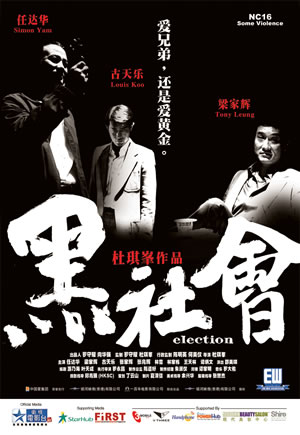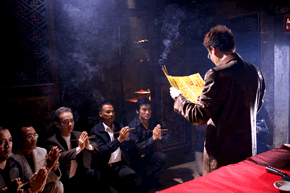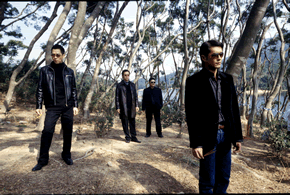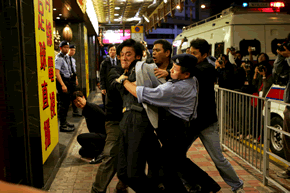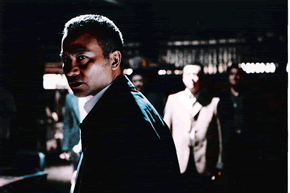|
Festival
De Cannes Official Selection Competition - 2005
Genre:
Action/Drama
Director: Johnny To
Starring: Simon Yam, Louis Koo, Cheung Ka
Fai, Tony Leung Ka Fai
RunTime: 1 hr 30 mins
Released By: Eng Wah
Rating: NC-16 (Some Violence)
Release
Date: 20 October 2005
Synopsis
:
The
time has come, as it does every two years, for the senior
members of Hong Kong’s oldest Triad, the Wo Shing Society,
to elect a new chairman. Fierce rivalries emerge between the
two eligible candidates. Lok, respected by the Uncles is the
favourite to win. But his rival Big D
will stop at nothing to change this, including going against
hundreds of years of Triad tradition and influencing the vote
with money and violence.
When Wo Shing’s ancient symbol of leadership, the Dragon’s
Heat Baton, goes missing, a ruthless struggle for power erupts
and the race to retrieve the Baton threatens to tear Wo Shing
in two. Can Wo Shing balance their traditional brotherhood
ways with the cut-throat modern
world of 21st century business?
Movie
Review:
The Triads and the Anti-Hero characters have defined themselves
as being integral to Hong Kong movies, with the "A Better
Tomorrow" series reining in the 80s, and the "Young
and Dangerous" series holding court in the 90s. However,
save for the Infernal Affairs trilogy in this decade so far,
it seemed that the formula might be too tried and tested to
come up with something innovative and different. We had a
somewhat false start with Mob Sister earlier this year. What
about Election?
Helmed
by acclaimed director Johnny To, this movie explores the struggles
of power within the literally translated Black Society, i.e.
Triads. The Wo Shing Society is undergoing a leadership renewal,
and the council of Uncles have to decide between two candidates,
Lok (Simon Yam) and Big D (Tony Leung Kar Fai). Distinctly
different personalities, each has their own strengths, and
it is for the Uncles to decide to go with the calm and composed
Lok, or the loud and highly volatile Big D.
Think
of the triads as an organized and well run conglomerate, in
the business of karaoke bars,
nightclubs, and various dens of Vice, with a board of directors
(the council of Uncles), tasked with the responsibility of
electing a new leader (chairman, CEO) amongst potential candidates,
each with a different manifesto to bring the company to greater
heights. It parallels the way legitimate businesses are run,
and this in itself makes the film accessible to many in the
working world.
Naturally,
bribery, the asking of favours, and the making of promises
are expected, as Big D tries hard to cement himself as the
forerunner. Willing to forgo strong traditions which is a
hallmark of the age old Wo Shing Society, Big D has half the
mind to splinter away from Wo Shing, hence potentially crippling
it and bringing about an intra-triad war.
A
running parallel plot is the quest of both Lok's and Big D's
men in the search of Wo Shing Society's heirloom, a wooden
Dragon's Head, which is the artifact of the de-facto leader
of the organization. Changing hands multiple times from its
resting place in China to Hong Kong, the audience is kept
at the edge of their seats with plenty of ambiguous side switches,
not knowing who's playing for who, and what's in it for those
who have in possession the Dragon's Head. With Wo Shing members
in the thousands, it rings home the message that in every
big organization, not everyone knows every other member, and
this plot brought out the message vividly.
This
movie relies heavily on screen veterans like Yam, Tony, Louis
Koo, and a host of better known Hong Kong television actors,
which is a good breather from the Gen-X / Gen-Y teenyboppers,
to flesh out the roles. Yam was his usual calm and cool demeanour,
as
contrasted to the over the top flamboyance that Tony brought
to his role. Louis Koo plays the wildcard in the movie - little
screen time, but owning one of the action sequences together
with Nick Cheung Kar Fai.
While
the buildup was excellent, this movie suffers from the Mutiple
Ending Syndrome. Just when you thought that it's a wrap, there's
a little bit of extra which propels the movie forward again,
and again. Either of the earlier endings would have sufficed,
but I guess the filmmakers wanted to put in a reminder message
that Crime Does Not Pay, that absolute power corrupts absolutely,
and I felt the slight twist at the end seemed to be there,
just for this sole purpose.
Movie
Rating: -
  
(Great
behind the scenes look at the machinery behind the Triads,
but let down by the
indecisive conclusion)
Review
by Stefan Shih
|

